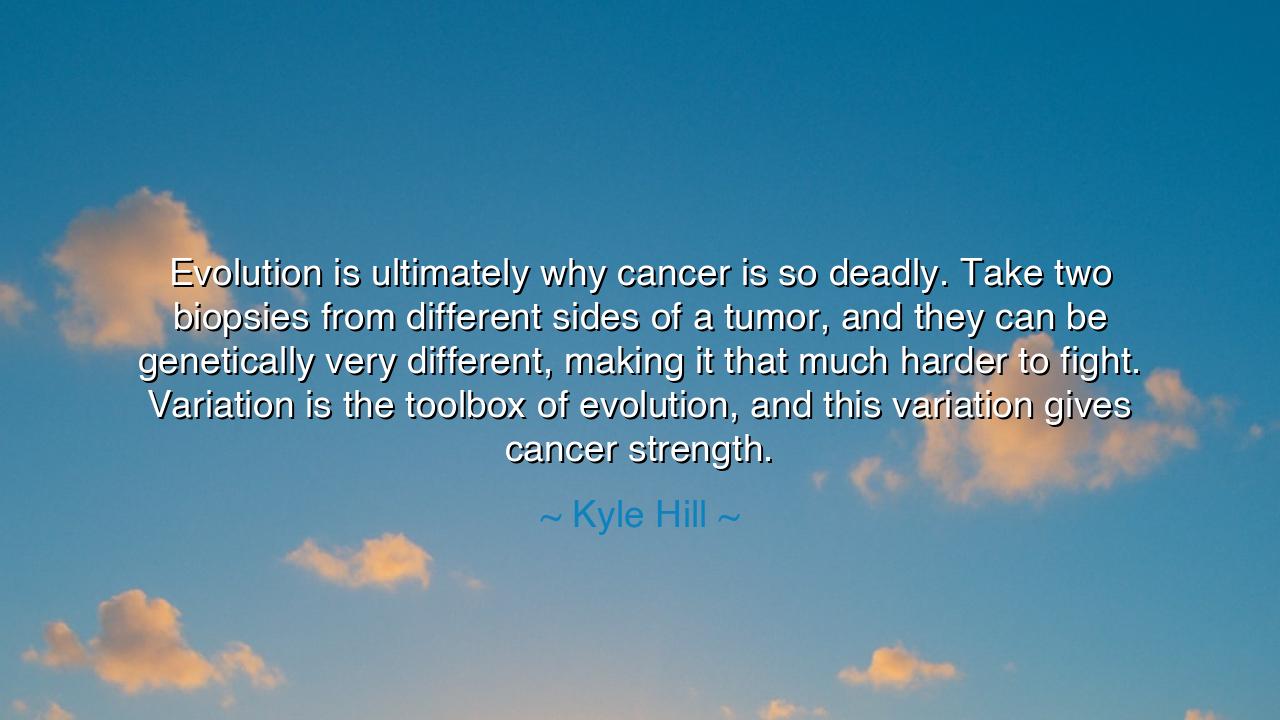
Evolution is ultimately why cancer is so deadly. Take two
Evolution is ultimately why cancer is so deadly. Take two biopsies from different sides of a tumor, and they can be genetically very different, making it that much harder to fight. Variation is the toolbox of evolution, and this variation gives cancer strength.






Hear, O seekers of wisdom, the words of Kyle Hill, who spoke not of myth or legend but of the hidden war within the human body: “Evolution is ultimately why cancer is so deadly. Take two biopsies from different sides of a tumor, and they can be genetically very different, making it that much harder to fight. Variation is the toolbox of evolution, and this variation gives cancer strength.” In this reflection lies a sobering truth—that the same force of evolution which grants life its resilience can also give disease its terrible power.
For what is evolution but the endless dance of variation and survival? It is the reason life persists through ages of ice and fire, through famine and flood. Yet this gift of resilience is not always a blessing; it can be twisted into the strength of our enemies. Cancer, that ancient affliction, thrives because it evolves within us. Each cell becomes a cunning adversary, mutating and diversifying so that no single strike can easily end it. Where we seek order, it breeds chaos; where we seek healing, it hides behind variation.
The origin of Hill’s words lies in the discoveries of science, in the grim lessons of countless battles fought in laboratories and hospitals. Physicians have found that two samples of the same tumor may bear entirely different mutations, as if one enemy were many. This is why treatments fail, why cures remain elusive—because the foe is not fixed, but shifting, adapting, reborn in endless forms. The strength of cancer lies not in its size, but in its diversity, a mirror of the very process that has carried life across eons.
History too gives us metaphors of this truth. Consider the wars of human empires against foes who never fought as one, but as many. The Romans, mighty in discipline, struggled against guerrilla bands who knew the hills and forests, striking from one side, retreating to another. No single victory could end them, for their strength lay in variation and unpredictability. So too with cancer: even when one outpost is destroyed, another mutates and survives, carrying on the battle.
Yet, O listeners, do not despair at this teaching. For to understand the strength of cancer is also to understand the path toward its defeat. Just as evolution arms the disease with variation, so must knowledge and science arm humanity with persistence and creativity. If one weapon fails, another can be forged; if one path closes, another can be discovered. The story of human progress has always been the story of outthinking the forces that threaten us.
The lesson for our lives is broader still. Cancer teaches us that variation is power. In our own journeys, we must learn to adapt, to evolve, to face challenges not with one rigid answer but with creativity and resilience. Where disease uses variation for destruction, we must use it for growth. In our work, in our struggles, in our communities, the ability to change, to diversify, to approach problems from many sides, is the strength that ensures survival.
Practical is this counsel: cultivate adaptability in your mind and in your life. Do not rely on one skill alone, but learn many. Do not cling to one idea, but remain open to growth. When hardship comes, shift like the river, bend like the reed, and you will not be broken. Let the terrible strength of cancer remind you that survival belongs not to the strongest alone, but to the most adaptable.
Thus remember the words of Kyle Hill: “Variation is the toolbox of evolution, and this variation gives cancer strength.” Take this not only as a warning of a deadly foe, but as a teaching for your own path. For the same power that makes disease so formidable can make you unconquerable—if you harness variation not for destruction, but for wisdom, resilience, and life everlasting.






AAdministratorAdministrator
Welcome, honored guests. Please leave a comment, we will respond soon